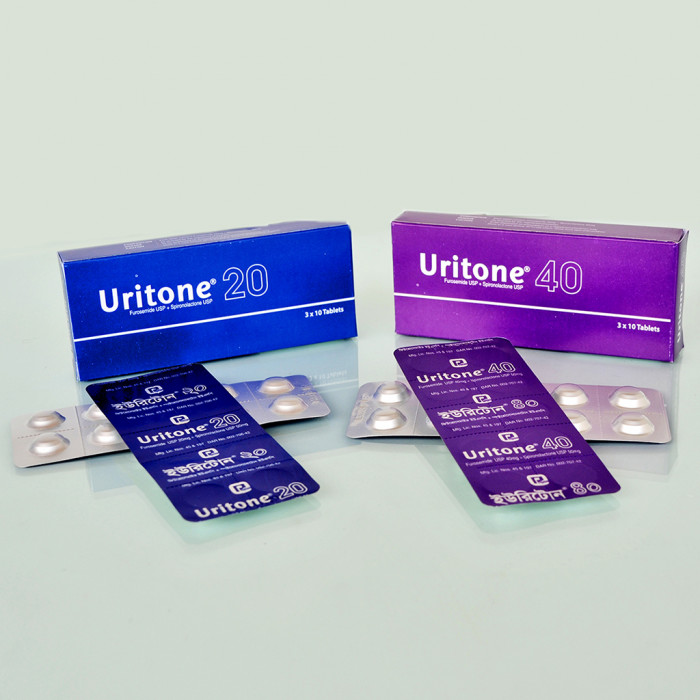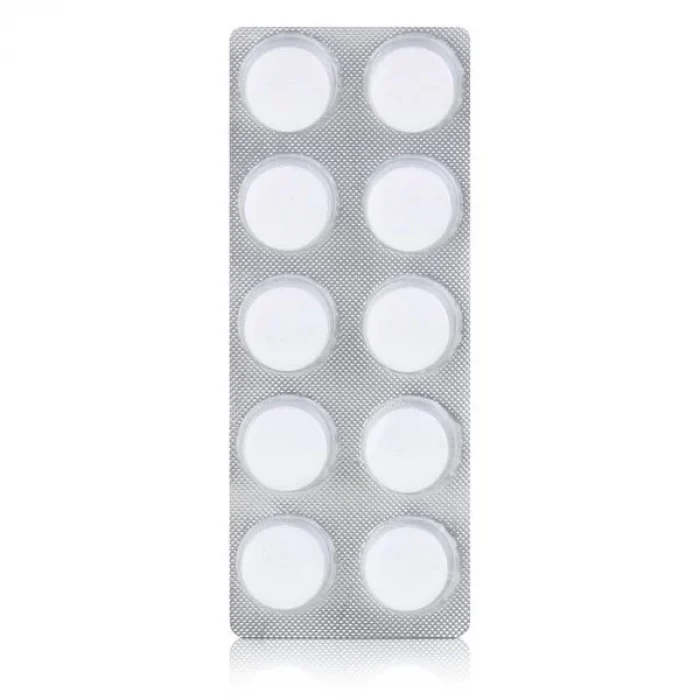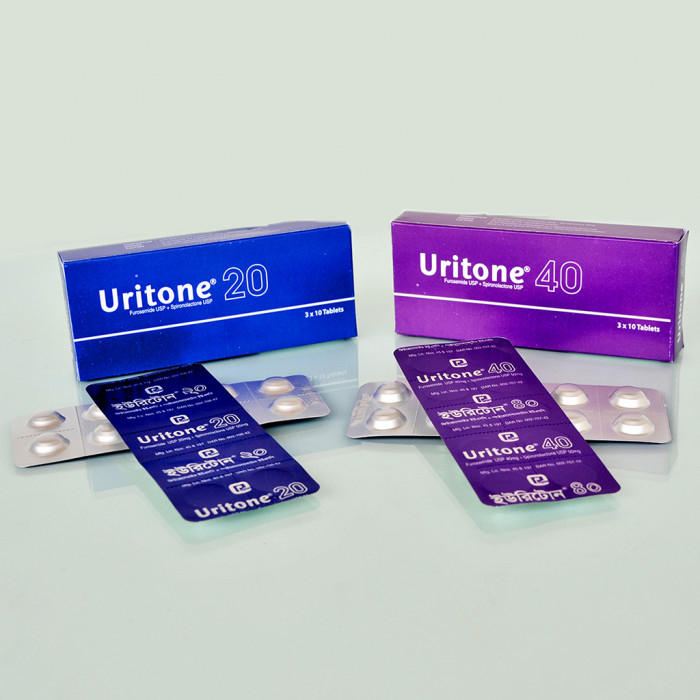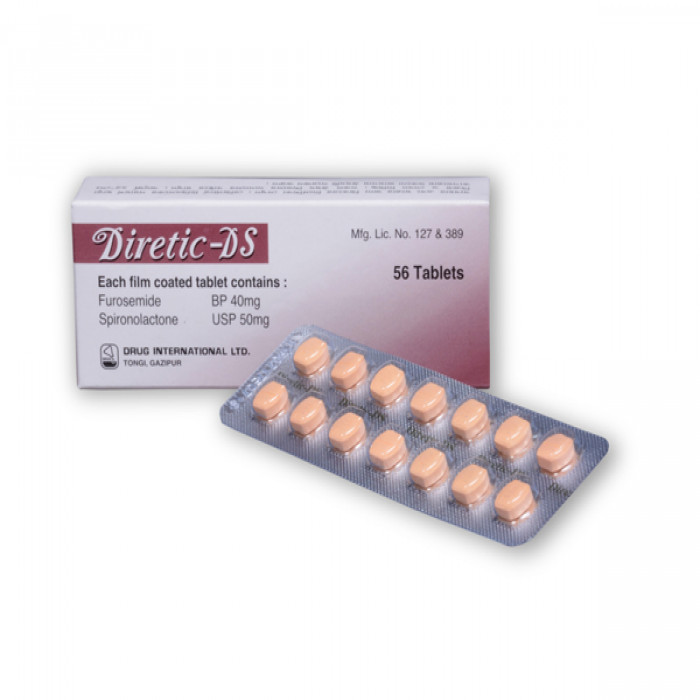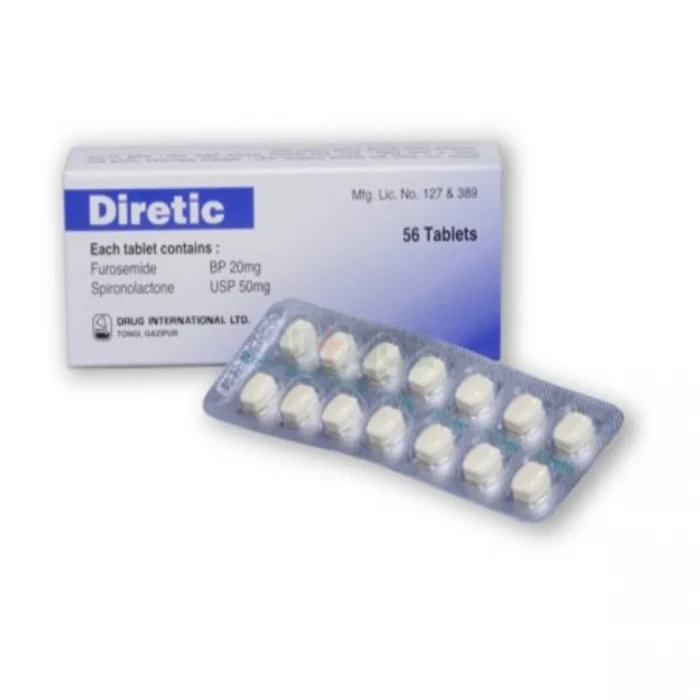
✔ 100% Authentic Product
👁️ Currently Viewing 5341
Diretic Tablet
Diretic Tablet (Furosemide 20mg + Spironolactone 50mg) belongs to the class of medications known as 'diuretics' (water pills), which aid in the removal of excess water from the body. Aside from that, it keeps the potassium level in the circulation stable and prevents hypertension (high blood pressure caused by edema (fluid retention). Oedema, also known as fluid overload, is linked to pulmonary hypertension (high blood pressure in the lungs) or heart failure (irregular heart pumping). Shortness of breath, chest discomfort (angina), irregular heart rhythms (arrhythmia), and swelling in other parts of the hands or belly are the most common symptoms of edema.
Discount
Price: ৳ 93
MRP:
৳
98
5%
Off

100% Genuine Products, Guaranteed

Safe & Secure Payments, Always

Fast, Secure & Efficient Delivery

Proper Packaging
 Cash on Delivery - All over Bangladesh
Cash on Delivery - All over Bangladesh Regular Delivery - 12-24 Hours, Dhaka City* Charge Tk.39-59
Regular Delivery - 12-24 Hours, Dhaka City* Charge Tk.39-59 Regular Delivery - 24-48 Hours, Other Cities* Charge Tk.99-110
Regular Delivery - 24-48 Hours, Other Cities* Charge Tk.99-110
🌙 রমযান অফার 🌙
 ফ্রি ডেলিভারিঃ - ৭৯৯ টাকা+ অর্ডারে, ঢাকা
শহরে
ফ্রি ডেলিভারিঃ - ৭৯৯ টাকা+ অর্ডারে, ঢাকা
শহরে ফ্রি ডেলিভারিঃ - ২৭৯৯ টাকা+ অর্ডারে, ঢাকার
বাহিরে
ফ্রি ডেলিভারিঃ - ২৭৯৯ টাকা+ অর্ডারে, ঢাকার
বাহিরে
📲 মোবাইল অ্যাপ অর্ডারে সাশ্রয় বেশী
-
Google Play Store থেকে ডাউনলোড
-
Apple Store থেকে ডাউনলোড
100% Genuine Products, Guaranteed
Safe & Secure Payments, Always
Fast, Secure & Efficient Delivery
Proper Packaging
 Cash on Delivery - All over Bangladesh
Cash on Delivery - All over Bangladesh Regular Delivery - 12-24 Hours, Dhaka City* Charge Tk.39-59
Regular Delivery - 12-24 Hours, Dhaka City* Charge Tk.39-59 Regular Delivery - 24-48 Hours, Other Cities* Charge Tk.99-110
Regular Delivery - 24-48 Hours, Other Cities* Charge Tk.99-110 ফ্রি ডেলিভারিঃ - ৭৯৯ টাকা+ অর্ডারে, ঢাকা
শহরে
ফ্রি ডেলিভারিঃ - ৭৯৯ টাকা+ অর্ডারে, ঢাকা
শহরে ফ্রি ডেলিভারিঃ - ২৭৯৯ টাকা+ অর্ডারে, ঢাকার
বাহিরে
ফ্রি ডেলিভারিঃ - ২৭৯৯ টাকা+ অর্ডারে, ঢাকার
বাহিরে- Google Play Store থেকে ডাউনলোড
- Apple Store থেকে ডাউনলোড
🌙 রমযান অফার 🌙
📲 মোবাইল অ্যাপ অর্ডারে সাশ্রয় বেশী
✅ Description:
Diretic Tablet is a combination medication that contains two active ingredients: Spironolactone and Furosemide. It is commonly used in the treatment of various conditions, including:
- Oedema: Oedema refers to the accumulation of excessive fluid in the body tissues. Diretic Tablet helps to reduce edema by increasing the excretion of water and sodium through the urine.
- Secondary hyperaldosteronism: This condition involves the excessive production of a hormone called aldosterone by the adrenal glands. Diretic Tablet is effective in treating edema associated with secondary hyperaldosteronism by inhibiting the effects of aldosterone and promoting the excretion of water and sodium.
- Chronic congestive cardiac failure: In this condition, the heart is unable to pump an adequate amount of blood to meet the body's needs. Diretic Tablet is used to manage edema associated with congestive cardiac failure by reducing fluid retention and relieving symptoms such as swelling and shortness of breath.
- Hepatic cirrhosis: Hepatic cirrhosis is characterized by scarring of the liver, which impairs its normal function. Diretic Tablets can be used to treat edema in patients with hepatic cirrhosis by promoting diuresis (increased urine production) and reducing fluid accumulation.
Overall, Diretic Tablet helps to alleviate fluid retention and associated symptoms by increasing urine production and enhancing the excretion of water and sodium from the body. It is important to note that the use of this medication should be under the guidance of a healthcare professional, as they can determine the appropriate dosage and monitor its effects.
Safety Advices

Alcohol
UNSAFE
Avoid consumption of alcohol while taking Diretic Tablet as it might make you feel dizzier.

Pregnancy
UNSAFE
Diretic Tablet is generally not recommended for use in pregnant women. However, consult your doctor before taking it.

Breastfeeding
UNSAFE
Diretic Tablet is generally not recommended for use in breastfeeding women. However, consult your doctor before taking it.

Driving
CAUTION
Do not drive or operate any machines if you feel dizzy or unwell after taking Diretic Tablet.

Kidney
CONSULT YOUR DOCTOR
Diretic tablets are to be taken with caution, especially if you have a history of Kidney diseases/conditions. Your doctor may adjust your dose depending on your current kidney conditions.

Liver
CONSULT YOUR DOCTOR
Diretic Tablets are to be taken with caution, especially if you have a history of liver diseases/conditions. Your doctor may adjust your dose depending on your current liver conditions.
✔️ Uses of Diretic Tablet
- Treat Oedema (Fluid Overload),
- Hypertension (High Blood Pressure).
✔️ How does Diretic Tablet work?
Diretic Tablet acts by removing the excess water and certain electrolytes (sodium and chloride) from the body in the form of urine while simultaneously maintaining the levels of potassium in the body.
✔️ Side Effects of Diretic Tablet
- Chest pain
- Cough or hoarseness
- Diarrhea
- Stomach upset
- Nausea or vomiting
- Electrolyte disturbances
- Dehydration
- Hyponatremia (low sodium concentration in the blood)
- Hypochloraemia (low blood levels of chloride)
- Hypokalaemia (low potassium levels)
- Increased blood cholesterol
- Increased uric acid
- Low blood pressure (hypotension)
- Orthostatic hypotension
- Increased urine volume
- Headache
- Drowsiness/somnolence
✔️ Quick Suggestions:
- Take Diretic Tablet in the morning with breakfast to minimize the need to urinate at night.
- Be cautious as Diretic Tablet may cause dizziness or drowsiness. Avoid driving or engaging in activities that require concentration until you know how it affects you.
- When transitioning from sitting or lying down to standing, rise slowly to reduce the risk of feeling dizzy or fainting.
- Include antioxidant-rich foods in your diet, such as blueberries, cherries, tomatoes, squash, and bell peppers.
- Consume natural diuretic foods like asparagus, beets, green beans, grapes, onions, leafy greens, pineapple, leeks, pumpkin, and garlic.
- Opt for healthy cooking oils like soybean, olive, canola, and coconut oil.
- Avoid refined foods such as white bread, spaghetti, sugar, and red meat.
- Minimize or eliminate consumption of trans fatty acids found in commercially baked items and processed foods.
- Limit your salt intake and avoid overly salty foods.
- Engage in regular physical activity, such as walking, to improve blood flow.
- Elevate your legs or the swollen area on a chair or pillows whenever possible.
- Avoid prolonged periods of standing or sitting.
- Manage chronic stress as it can contribute to high blood pressure. Spend time with loved ones and practice mindfulness techniques to cope with stress.
- Quit smoking and limit alcohol consumption to reduce the risk of health complications.
- Regular monitoring of serum potassium, sodium, and creatinine levels is necessary during treatment with Diretic Tablet.
- Be aware of potential side effects such as excessive urine production, dehydration, and low electrolyte levels. Notify your doctor if you experience persistent dizziness, fatigue, or muscle weakness.
- Your doctor may conduct regular monitoring of your blood pressure, kidney function, and electrolyte levels while you are taking Diretic Tablet.
✔️ Indication
Oedema is a disorder characterized by an abnormal buildup of fluid in bodily tissues. Diretic Tablet is used to treat edema caused by secondary hyperaldosteronism (excess hormone synthesis by the adrenal gland), chronic congestive cardiac failure (inability of your heart to pump enough blood), and hepatic cirrhosis (liver scarring).
✔️ Pharmacology
Spironolactone and Furosemide have different mechanisms of action and target different sites in the kidneys. When used together, they have complementary effects and can produce an additive or synergistic diuretic effect.
Furosemide, known as a loop diuretic, acts on the Na+/K+/2Cl- co-transporter in the ascending limb of the Loop of Henle. It inhibits this transporter, blocking the reabsorption of sodium, potassium, and chloride ions. This action leads to increased excretion of sodium and water in the urine, resulting in diuresis. However, the potassium loss caused by Furosemide is a common side effect.
Spironolactone, on the other hand, is a potassium-sparing diuretic that acts at the distal tubule of the nephron. It works by antagonizing the action of aldosterone, a hormone that promotes the reabsorption of sodium in exchange for potassium. By inhibiting aldosterone, spironolactone promotes the excretion of sodium and reduces the excessive loss of potassium caused by Furosemide.
The combination of these two diuretics allows for a more comprehensive and balanced diuretic effect. Furosemide increases the excretion of sodium and water, while spironolactone helps to counterbalance the potassium loss and maintain a more favorable sodium-to-potassium ratio.
✔️ Dosage & Administration of Diretic Tablet
- In adults, each Diretic Tablet contains 20 mg of furosemide and 50 mg of spironolactone. The recommended dosage for Diretic Tablet can vary depending on the individual's condition and the prescribing physician's instructions.
- The usual dosage range is 1 to 4 tablets per day.
- Take this medicine in the dose and duration as advised by your doctor. Swallow it as a whole.
- Do not chew, crush or break it. Diretic Tablet is to be taken with food.
- Avoid Diretic Tablet with dietary sodium.
✔️ Interaction
Interactions with other medications:
High blood pressure-lowering pills (metoprolol, ramipril, hydrochlorothiazide, atorvastatin): Diretic tablets may interact with these medications used to treat high blood pressure. It can further lower blood pressure, potentially leading to a severe condition. Close monitoring of blood pressure is necessary when using these medications together.
- Medicine to treat erectile dysfunction (sildenafil): Diretic Tablet can interact with sildenafil, a medication used to treat erectile dysfunction. The combination can lead to a significant drop in blood pressure, which may cause dizziness, lightheadedness, and even fainting. The use of these medications together should be avoided or closely monitored by a healthcare professional.
- Anti-epilepsy medicines (carbamazepine, phenobarbital): Diretic tablets may interact with anti-epilepsy medications, potentially reducing their effectiveness. Dose adjustments or alternative treatment options may be necessary in such cases.
- Immune-suppressing drugs (cyclosporine): Diretic Tablet can interact with cyclosporine, which is used to suppress the immune system. This interaction may increase the risk of adverse effects and require careful monitoring by a healthcare professional.
- Painkillers (ibuprofen, aspirin): Diretic tablets may interact with certain painkillers, such as ibuprofen and aspirin, which can affect kidney function and increase the risk of kidney damage. It is important to use these medications cautiously and under medical supervision
Drug-Food Interaction: Consuming alcohol while taking Diretic Tablet can lead to unpleasant side effects. It is recommended to avoid alcohol to prevent any potential adverse reactions.
Drug-Disease Interactions: Diretic Tablet should not be given to individuals with the following conditions:
- Cardiogenic shock: When the heart fails to pump sufficient blood to meet the body's needs.
- Heart valve problem (stenosis): Narrowing of heart valves, affecting blood flow.
- Low blood pressure (hypotension): Abnormally low blood pressure levels.
- Coronary heart disease: A condition characterized by reduced blood flow to the heart.
- Liver disease: Impaired liver function.
- Heart failure: Inability of the heart to pump blood effectively.
- Low serum potassium (hypokalemia): Low levels of potassium in the blood.
- Nil urine output (anuria): Complete absence of urine production.
It's crucial to consult with a healthcare professional before starting or stopping any medication, as they can provide personalized advice and ensure the safe and effective use of Diretic Tablet based on individual circumstances.
✔️ Contraindications
Diretic Tablet should not be used in patients who have anuria (complete absence of urine production), severe renal impairment, rapid deterioration or significant impairment of renal function (creatinine clearance less than 30 ml/min), hyperkalemia (high levels of potassium in the blood), Addison's disease (adrenal gland disorder), or patients who have a known allergy or hypersensitivity to Spironolactone, Furosemide, or sulphonamides.
✔️ Pregnancy & Lactation
During pregnancy, the use of Spironolactone should be carefully evaluated, considering the potential risks to both the mother and the fetus. Spironolactone and its metabolites can cross the placental barrier. Animal studies have shown that Furosemide, another component of Diretic Tablet, may cause fetal abnormalities. Therefore, Furosemide should only be used in women of childbearing age when appropriate contraceptive measures are taken, or if the potential benefits outweigh the potential risks to the fetus.
In the case of lactation, metabolites of Spironolactone have been detected in breast milk. If the use of Spironolactone is considered necessary, it is advisable to explore alternative methods of infant feeding. Furosemide is excreted in breast milk, and breastfeeding should be suspended if treatment with Furosemide is deemed necessary.
✔️ Precautions & Warnings
Diretic Tablet should be avoided in individuals who have a known allergy or hypersensitivity to the medication. It is also contraindicated in individuals with low blood pressure (less than 90 mm Hg), a history of heart attack, kidney disease (with creatinine clearance less than 30 mL/min), liver disease, pregnancy, or those who are planning to become pregnant. Breastfeeding women should also exercise caution as Diretic Tablet can pass into breast milk, although its effects on the baby are not known. It is advisable to inform your doctor if you are taking Diretic Tablet while breastfeeding.
Furthermore, Diretic Tablet should not be used in individuals with low blood pressure (hypotension), cardiogenic shock (sudden reduction in blood flow to the heart), or aortic stenosis (a heart valve problem). Special attention should be given to individuals who rely on their voice for their work, such as actors, singers, or teachers, as Diretic Tablet may cause vocal changes.
Before initiating treatment with Diretic Tablet, it is important to correct any hypovolemia or dehydration, as well as address any electrolyte and acid-base imbalances present in the individual.
✔️ Storage Conditions
Keep below 30°C temperature, absent from light & dampness. Keep out of the reach of children.
⚠️Disclaimer:
At ePharma, we’re committed to providing accurate and accessible health information. However, all content is intended for informational purposes only and should not replace medical advice from a qualified physician. Please consult your healthcare provider for personalized guidance. We aim to support, not substitute, the doctor-patient relationship.




